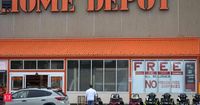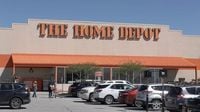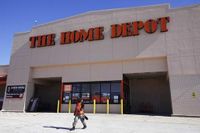In an unexpected twist of humor gone awry, Home Depot found itself at the center of an April Fool's Day prank that left many customers confused and irate. Reports circulated on social media claiming that the home improvement giant would soon implement parking fees at its stores nationwide, purportedly as a response to rising inflation. However, this rumor was quickly debunked as a hoax.
The prank originated from Pro Tool Reviews, a tool review website, which published an article on April 1, 2025, stating that Home Depot would begin charging customers for parking. The article claimed that the fee structure would vary by location, with charges ranging from $2 for up to two hours in central Florida to $5 for a full day of parking in Los Angeles. It even suggested that customers could avoid the fees by spending over $250 in a single visit or by joining the store's loyalty program.
Despite the article being labeled as an April Fool's joke at its conclusion, many consumers failed to register the date and took the claims seriously. Social media users expressed their outrage, with some even proposing hashtags like #BoycottHomeDepot in response to the supposed new policy.
Home Depot was quick to respond to the uproar. On April 2, the company took to its official social media account to clarify the situation, stating, "This is an April Fools' post from a tool review website. We do not charge for parking." A spokesperson for the company reiterated this message, emphasizing that Home Depot does not plan to implement any parking fees.
The article from Pro Tool Reviews, while intended as a humorous prank, inadvertently sparked a wave of concern among shoppers, particularly as many Americans are already jittery about rising prices due to inflation and other economic pressures. The timing of the prank, coinciding with discussions about inflation and tariffs, only added fuel to the fire.
In a statement to PIX11 News, a Home Depot spokesperson explained that the prank was published without the company's knowledge, asserting, "No, this is not true. We do not charge parking lot fees and don’t plan to." This clarification came after a barrage of complaints from customers who were misled by the fake news article.
As the dust settled, Pro Tool Reviews acknowledged the viral nature of their prank. Editor-in-chief Kenny Koehler remarked that the article's high viewership was "truly humbling," and he expressed hope that Home Depot could find humor in the situation as well.
This incident is not the first time an April Fool's joke has backfired. Companies like Google and Volkswagen have faced backlash for their ill-timed pranks in the past. For instance, in 2016, Google announced a fictitious Gmail feature involving animated Minions, which drew criticism and confusion. Similarly, in 2021, Volkswagen's prank about changing its American division's name to "Voltswagen" led to stock fluctuations and public confusion.
The origins of April Fool's Day date back to 16th century France when King Charles IX decreed that the new year would no longer begin with Easter but instead on January 1. Those who continued to celebrate the new year on the old date were dubbed "April fools." This historical context adds a layer of irony to the recent prank, as it highlights how the tradition has evolved into a widespread practice of playful deception.
Despite the initial backlash, it seems that Home Depot is now back on track, continuing to focus on its core business without the added stress of parking fees. Meanwhile, customers can rest easy knowing that their shopping experience will remain unchanged.
As the situation illustrates, the line between humor and reality can sometimes blur, especially in a climate where consumers are already wary of rising costs. For Home Depot, this prank serves as a reminder of the importance of clear communication and the potential consequences of misleading information, even when intended as a joke.









